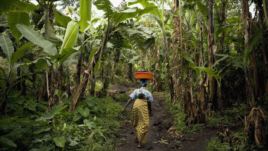VOA慢速英语:Project in DRC Aims to Increase Fertilizer Use
- 听力原文
Project in DRC Aims to Increase Fertilizer Use
This is the VOA Special English Agriculture report.
North Kivu is a war-torn province that used to be called the breadbasket of the Congo. Now, some farmers are being trained to increase the productivity of their land with fertilizer.
The International Fertility Development Center is supporting the project. The IFDC is a nonprofit group based in the United States.

A Congolese woman carries her baby and personal belongings
through a banana plantation near the town of Rangira, affected
by recent fighting between government forces and rebels around
North Kivu in eastern Democratic Republic of Congo
The project includes planting trees. Trees help prevent the loss of soil through erosion. They also provide charcoal for fuel. And they provide fertilizer in the form of leaves. These get plowed into the soil.
Other farmers are experimenting with chemical fertilizer. The farmers use a mixture of chemical and organic fertilizer. They also use improved seed. They say they have succeeded in growing three or four times as much maize, rice, beans and potatoes.
The fertilizer costs around a dollar and thirty cents a kilo. But workers from the IFDC say if it triples a yield of potatoes, for example, it means twice the profit.
Farmer Adrien Kangele says the new methods promoted by the group could be a solution to ethnic conflicts in the Kivu region. Fertilizer brings peace, he says, because more people can earn a living from the soil in this densely populated area.
One of the trainers, Sandra Kavira Kawisse, says fertilizer can even save marriages. She says in one area, many of the men had left their wives and gone to work in the mines. Then their wives started using fertilizer and their yields of rice tripled. The IFDC has found that when the men work with the women, the harvests are nine tons a hectare compared with six tons when the women work alone.
Dutch scientist Henk Breman designed the fertilizer project. He says the Democratic Republic of Congo uses less chemical fertilizer per hectare than any other country. Mr. Breman suggests two reasons. One is a lack of government policy. The other is the influence of donors and international nongovernmental organizations that were against more intensive ways of farming.
HENK BREMAN: "There has been a period of about twenty years where donor support was dominated by policies that looked for other ways of developing agriculture than the intensive way elsewhere. I really accuse the donors and the international NGOs for part of the famine in Africa."
Edwige Mungwana Kavor is a local agronomist who works for Mercy Corps, an NGO. She says she is not against adding chemical fertilizer to organic matter. But she says land can become dependent on chemical fertilizers and no longer produce without them. Also, the chemicals can pollute groundwater.
Henk Breman agrees farmers should mix it with organic fertilizer. But he says there is a much bigger risk from soil erosion in the Kivu region.
HENK BREMAN: "The soil nutrient balance of this region is the most negative in the world."
Farmers groups have welcomed a promise by the DRC government to end taxes on fertilizers. Those taxes are some of the highest in central Africa.
And that's the VOA Special English Agriculture Report. I'm Jim Tedder.
___
Contributing: Nick Long
- 频道推荐
- |
- 全站推荐
- 推荐下载
- 网站推荐




















